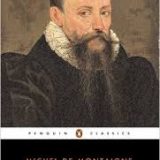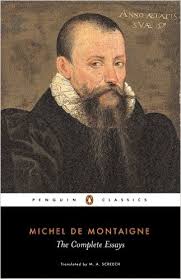Complete Essays – Michel de Montaigne – 1580
Reviewed by: Michael Sympson Date: 17 September 2001
The voice of a good friend.
 Should I ever be forced to run away from war and disaster with nothing else but one book in a torn briefcase, or find myself at the business-end of a feeding tube in a hospital waiting for my last breather, then Montaigne would be a strong candidate to keep me company in this last and loneliest hour. Not that I have a hard time to choose, there are really only two other books I would consider, and it is most definitely not the bible, but Montaigne always conveyed to me the warmth and comfort of a good friend. Even when he sometimes loses me and prattles away on some obsession of his, it is like listening to your best friend without really listening, you are just glad he is there.
Should I ever be forced to run away from war and disaster with nothing else but one book in a torn briefcase, or find myself at the business-end of a feeding tube in a hospital waiting for my last breather, then Montaigne would be a strong candidate to keep me company in this last and loneliest hour. Not that I have a hard time to choose, there are really only two other books I would consider, and it is most definitely not the bible, but Montaigne always conveyed to me the warmth and comfort of a good friend. Even when he sometimes loses me and prattles away on some obsession of his, it is like listening to your best friend without really listening, you are just glad he is there.
What is it about this Frenchman I wonder, that has endured for such a long period of time? Shakespeare too still speaks to us, but often in a somewhat muffled voice, time and distance are beginning to tell – but Montaigne, who predated Shakespeare and even provided Hamlet with a few clues and phrases, strikes us still as fresh and modern as ever. He is one of those writers of which I have read every line ever printed; and apart from his essays, the itinerary of his travel to Italy has always been of particular interest to me, because it describes places I used to know intimately. How could times have changed so much (and certainly not always to the better). But in Montaigne this remote period comes to life again, its comforts (or rather the lack of it), its smells, its customs, and of course the food (Montaigne was French after all). Through Montaigne their presence remains tangible and glows like memories of a distant childhood.
Essays are supposed to enquire into some topic and come up with something conclusive to say about – well except for the real great essayists like Charles Lamb who never get that far to be conclusive on anything whatsoever. Same here. After the fall of Rome, Montaigne is perhaps the earliest example of a writer in Western literature, who gives us “nature seen through a temperament” (Zola), and Montaigne is nothing if not a temperament. Well read people may contest this and point to Françoise Villon or Chaucer as earlier examples – I won’t debate it, but who of these gentlemen is still so very much alive as our Monsieur Montaigne? No dictionary or glossary needed, just snuggle up in your favorite armchair and enjoy.
Authors have pedigrees (their favorite authors) and a reader has preferences (his favorite authors): if given the choice between Donne and Herbert I go for Dryden. (Really! It’s a bargain: you get Plutarch, Virgil, and Ovid as a bonus. Donne is just Donne, and Herbert just a case of well-spoken paranoia.) With Montaigne you open a window to the entire heritage of classic antiquity – sometimes it is like old gramophone recordings of long forgotten opera stars. In fact I have always found Seneca a bearable read only in Montaigne’s way of quoting him. Which brings us to the question which translation to use.
I own both, Donald M. Frame’s translation of the complete works, and Cotton’s staple translation of the essays. Which of the 2 comes closer to the tone of the original? Because despite a certain brand of bogus criticism in the vain of Northrop Frye and “post modern deconstruction” the author’s voice does matter! He might be many things, one of which is to be the messenger and witness of his own period, its concerns, its paraphernalia, its perspectives and smells, its way to express itself. So, without putting down Mr. Frame’s magisterial accomplishment, I for once shall hold on to my old Hazlitt edition of Cotton’s translation, and put Frame out on sale. It may not be the slickest read around, but at least the pacing and the rhythms of Cotton’s prose are the closest thing you can get to the original and it has earned Montaigne a citizenship in our own language.















